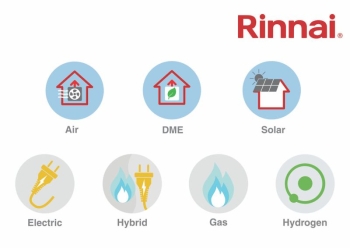Rinnai’s Chris Goggin looks at the potential impact of the new American President, Donald Trump, may have on international energy issues. This objective analysis on the global energy transition will cover carbon emissions, energy options and all climate issues relating to Net Zero. There is no conclusion but many questions.
The second presidency of Donald Trump could potentially impose a new direction of energy issues on America which could travel across the Atlantic towards Europe.
This article’s objective is to NOT adopt a bipartisan stance on political matters but instead aims to reflect the range of reportage carried by clean-energy focused multimedia, broadcast outlets and mainstream print as well as digital publications. Domestic and international energy distribution is a complex issue which could be further complicated by the proposed policies of the new President.
Since President Trump’s first term of presidency America has passed the Inflation Reduction Act (IRA) which is designed to reduce federal government budget deficit through investing in clean domestic energy production. The IRA ensures that tax credits are expanded for renewable projects, meaning that the potential for greater financial rewards is increased. A recent article in the Guardian newspaper has revealed that in a self-commissioned report the US (alongside India) has made the most progress in implementing climate policies since the 2016 Paris Agreement.
As a result, multiple renowned and established big businesses from across Europe, the UK and Asia have identified America as the ideal opportunity to earn large turnovers of revenue – and all have invested accordingly. Will America continue a NetZero path? Will America remain a member of the Paris Agreement?
Reverting to widespread domestic usage of fossil fuels is unlikely despite President-elect Trump selecting the CEO of oil and gas drilling technology company Liberty Energy – Christopher Wright – as the new DOE Secretary of Energy. An article published by The Guardian late last year states that solar power has been added to the American grid at 300% the rate of gas capacity throughout 2023.
The same article provides more detail that reveals the political cross-party complexity that the Inflation Reduction Act has created. President Trump is on record saying he aims to repeal IRA legislation. Doing so could jeopardize 300,000 new jobs and $150 billion in manufacturing investment – most which rests in Republican party states.
Instead, President Trump prefers to target fossil fuel extraction and usage despite major groundwork being completed that provides America with fertile commercial conditions that encourage foreign investment.
If he cannot repeal the Inflation Reduction Act his administration is expected to reverse important Environmental Protection Agency regulations that limit emissions from power plants as well as light and heavy-duty vehicles. From the available information on the subject, he would prefer to both repeal the IRA and axe environmental regulations.
A Trump administration could also take a different route towards the path of green energy utilisation. Project 2025, said to be a Republican policy platform, calls for the restructuring of federal agencies such as The Department of Energy, Department of Interior and Environmental Protection Agency. Reducing or nullifying the roles of these agencies could potentially impact funding for future clean energy projects.
A key funding program that could be cut by the Trump administration is Department of Energy Loans Programs Office which holds around $400 billion of finances. This department has provided numerous solar, nuclear and clean hydrogen projects with federal funds ensuring clean energy introduction into the American transmission grid. Project 2025 would also reportedly instruct the Interior Department to seek out further fossil fuels on American federal land.
Although US domestic renewable energy distribution could remain under Trump, America’s international commitments towards clean energy dispersal and agreed climate control measures could be scrapped. He will most likely remove America from the Paris agreement which aims to limit global warming by no more than 2 degrees Celsius from pre-industrial levels.
Experts from the across the world believe that a Trump administration will attempt to slow the international energy transition rather than completely reversing all progress. Huge amounts of money and labour in Republican states are reliant on renewable projects and clean energy. To jeopardize jobs and investments will be politically counterproductive to an avowedly populist president.
A further four years of Trump politics will mean that more American fossil fuels will be in the domestic and international markets. However, there is too much clean energy infrastructure and policy in place and too many nations switching to cleaner fuels for a global reduction.
Informing UK customers on all international energy matters is aimed at providing insight into possible energy market maneuverings and therefore a better understanding of global energy options. Rinnai hopes all information can assist the UK customer in better product and accompanying energy procurement.
For more information on global and national energy policy sign up to the Rinnai newsletter today!
